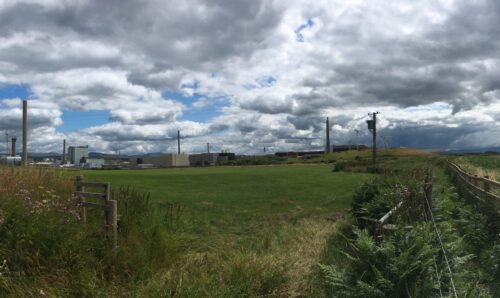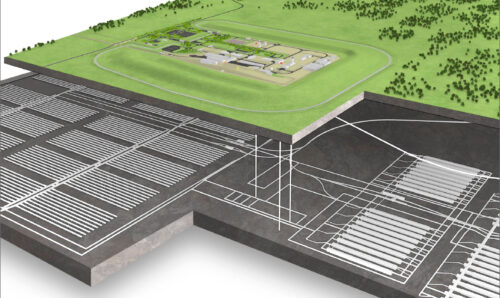Fukushima – Five years on
Blog 12 August 2017
A case study in unintended consequences
Author: Adrian Bull, Director of External Relations, National Nuclear Laboratory
Japan is a very neat and precise country. So it’s surreal to visit a Japanese town where roads are cracked, buildings neglected and with tall weeds everywhere. Yet this is Okuma – inside the exclusion zone of the March 2011 Fukushima accident. There has been no decontamination effort there, despite this happening elsewhere in the zone. Those former inhabitants who have returned have only done so for a few hours each time. Yet some things remain unchanged despite the abandonment. Traffic lights still flash, the clock shows the correct time. And daily at noon a cheesy jingle plays over the town’s tannoy system.
I visited with a BBC trip marking Fukushima’s 5th anniversary, along with Prof Gerry Thomas from Imperial College – an expert on health effects of radiation who has visited Japan regularly. Approaching the exclusion zone, there are roadside radiation monitoring signs. Then at a checkpoint we’re given our protective clothing. Coats, over-trousers, over-shoes, gloves, facemasks and hair covers – and a dosimeter. This must be dangerous, right? Wrong. There is certainly more radiation than previously but putting the numbers into context makes things look rather different.
During a three hour visit, remaining outdoors, we each pick up 5 micro-Sieverts. Over a year, even for someone spending a lot of time outside, that’s an additional dose of perhaps 5 mili-Sieverts (mSv). A full body CT scan is around 10 mSv and the legal annual limit for UK nuclear radiation workers is 20 mSv.
During our meetings with Japanese Government, industry and others, the “logic” of the illogical becomes slightly clearer. Firstly, the Japanese authorities are – conservatively – following ICRP guidelines precisely, even though the guidance was not really set out with a situation such as this in mind. Secondly, we learned that the protective clothing is intended to make visitors feel reassured. So if we should pick up some contamination, it will be trapped on our coveralls. But does putting on all that gear reassure me? No – it has the opposite effect.
I was primarily in Japan was to share the UK Nuclear Industry Council’s work on communication and stakeholder engagement. Capturing the basic principles (openness and honesty, building trust, establishing a dialogue and consulting wherever possible) has been important in the UK and we can share this internationally. The Japanese were certainly keen to learn more.
The Japanese clearly do want to reassure the public, and they also want to re-start more of the reactors which have been offline for years, depriving people of vast amounts of power and further stressing an economy which is already suffering after the tsunami and earthquake. Yet whilst heritage (Japan is the only country ever bombed with nuclear weapons), legislation, culture and politics are all involved in defining the road to recovery, there seems to be relatively little room for science. Neither the “hard” science of radiation effects on health, nor the softer science of psychology, are receiving the priority which is perhaps necessary to allow the beautiful region around Fukushima to be restored to some form of normality.
A longer version of this post was originally published in the Nuclear Industry Association magazine.
About Adrian Bull
Adrian is Director of External Relations for the UK National Nuclear Laboratory. He is closely involved with a wide range of stakeholders including politicians, Government officials, media, customers, industry organisations and universities. He has worked on many submissions to UK Government consultations on nuclear and energy policy matters, and has given evidence to several UK Government Committees on energy issues. Recently he has been closely involved with the work of the Nuclear Industry Council on communication and public understanding of nuclear energy.
Adrian is a member of the nuclear communications groups at UK, European and global levels, through the UK Nuclear Industry Association, Foratom and the World Nuclear Association respectively. He is a Board Member of both Marketing Cheshire and the Science Media Centre and sits on a number of other committees for bodies such as the Confederation of British Industry and the UK Nuclear Institute. Adrian is a Fellow of the UK Energy Institute and in December 2011 was honoured to be named as the recipient of the Young Generation Network’s Award for Outstanding Contribution. He is also a member of The University of Manchester’s General Assembly.




